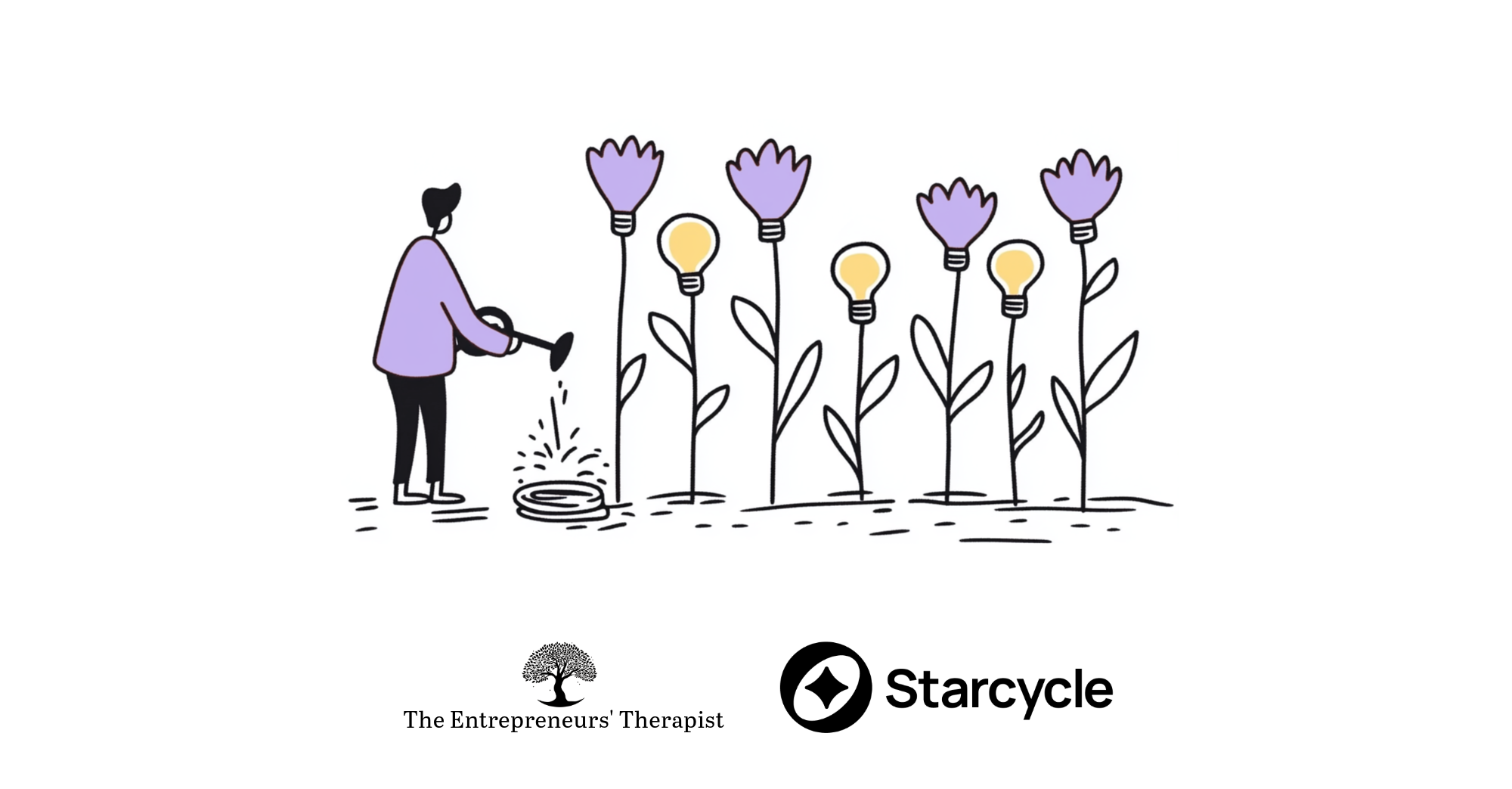How to Transform Business Failure into Growth Opportunities
How can we all navigate failure with more compassion, resilience, and growth — while protecting our peace of mind as founders?

At Starcycle, we have the privilege of collaborating with founders and ecosystem leaders who understand first-hand the emotional complexity of the entrepreneurial journey. We invite them to share their stories and the hard-earned insights they've gathered to support the broader founder community.
Shulamit Ber Levtov is The Entrepreneurs' Therapist. She helps founders protect their peace of mind and speaks across the startup ecosystem about the mental health impacts of entrepreneurship — and how we can all navigate failure with more compassion, resilience, and growth.
Failure.
Every entrepreneur faces it. Often, we experience failures over and over again.
I’ve had several businesses. I co-owned a steadicam. I was a freelance media and PR consultant and a freelance translator. I’ve had a consulting business, a psychotherapy practice, and a holistic clinic.
Only two were what would be called successful by objective standards.
How do you take these kinds of repeated blows and keep on going?
How do you shift the story from “I’m a failure” to something more empowering?
There are a couple of strategies that can serve you well: not taking things personally and learning from your mistakes.
I know, I know, those are such clichés. I’m sure you’re rolling your eyes. They evoke the same reaction in me as clichés do. However, when you turn them into practices, they can be very powerful.
Don’t take failure personally
One of the factors that makes entrepreneurs vulnerable to mental health challenges is the entrepreneur’s tendency to tie their identity and sense of self-worth to external assessments of success.
When things are going well, we can tell ourselves good things about ourselves, but when they’re going badly, we take it to mean there is something wrong with us.
We say things to ourselves like, “I’m a terrible entrepreneur.”
“I’m a fuck-up.”
“I can’t do anything right.”
This is what we mean when we say you’re taking failure personally.
“Don’t take it personally” means that whatever is happening is not a moral judgment on you as a human being.
When your business becomes your whole self and something goes wrong, it makes you vulnerable to a painful crisis of identity… and things often go wrong in business.
Believing there is something wrong with you, or something bad about you as a person, when the so-called failure is actually a hitch in business and attributable to many factors, only increases your distress.
Stress affects cognition–your thinking and reasoning skills. When your distress is high, it makes it even more difficult to gather your thoughts and access your creativity and problem-solving skills.
When you understand yourself as separate from your business and as a human being of inherent worth apart from your successes and failures, you can build a more balanced sense of identity on which you can rely when you feel stressed.
Your business is something you built, not something you are. This distinction can be the anchor that keeps you grounded when everything else feels uncertain.
Separate your sense of self from your so-called failure
Take time to notice the things you’re saying to yourself and the meaning you are attributing to what’s happening.
For example, your bank account is overdrawn. The meaning you may attribute to this is, “I’m shitty with money because I can’t cover my bills.” or “I’m a terrible business person because I have no clients.”
Separating the facts from the meaning you are attributing to them can make a big difference in your mental health.
It’s easier said than done. This process needs to be repeated over and over again. It’s not enough to support change simply to read this article or think about the idea.
Separating the facts from the meaning you are attributing to them is an ongoing practice. Use a journal, or do it in conversation with someone supportive, like your biz bestie, your coach, or your therapist.
How to “fail forward” and learn from your mistakes
Failure in itself does not have to be a catastrophe. However, failing to learn from your failure is a missed opportunity.
Finding the lessons in failure is what you could call a hindsight practice.
With the perspective of time, you can look back and identify what strengths and skills you brought to the situation.
Then ask yourself how those strengths and skills improved. Maybe you learned some new skills as well?
You can also be curious about what new information you gained in the course of the failure.
Consider this “failure” an iteration rather than an endpoint.
Think about how that will inform what you’re doing now or what you will do next time you encounter this problem or something similar, or even a new problem.
Here’s a worksheet to support you in working through the process I outline here.
Share your failure with others
Once you’ve done the work, it helps reinforce the mindset shift to share it with others. When you choose to tell a story that demonstrates you’re the kind of person who brings your strengths to challenges, this sense of yourself will serve you well as a motivator when you hit future bumps in the road.
An additional benefit of telling your story of your strength is that it helps others. It introduces the idea that they, too, can look at failure differently and become stronger and more skilled as a result.
Failure is not the end. It’s a powerful point of transformation. Keep going.
Disclaimer:
The views and opinions expressed herein are the views and opinions of the author and do not necessarily reflect those of Starcycle, Inc., nor does contributing as an author establish or imply a client relationship with Starcycle, Inc.

